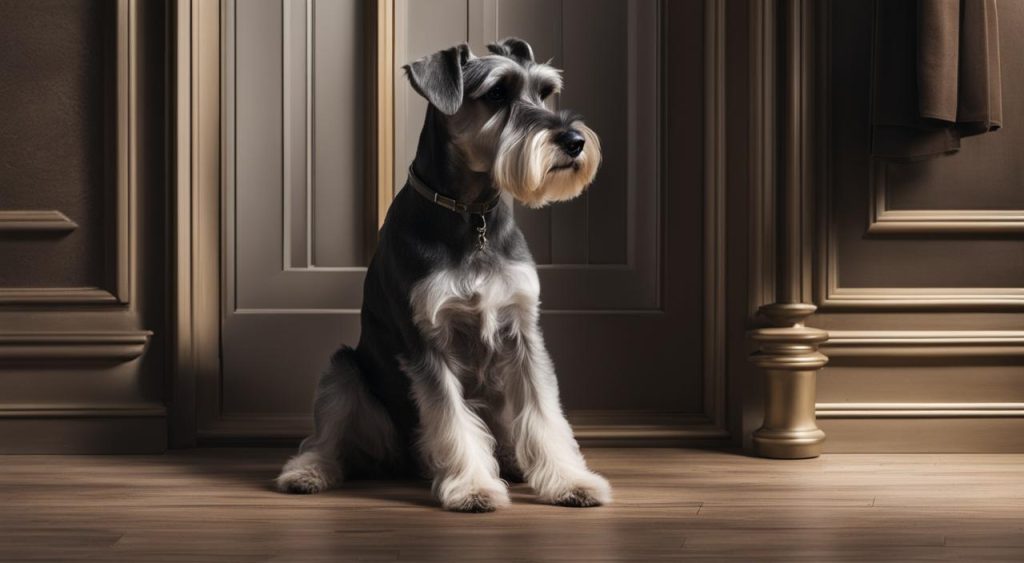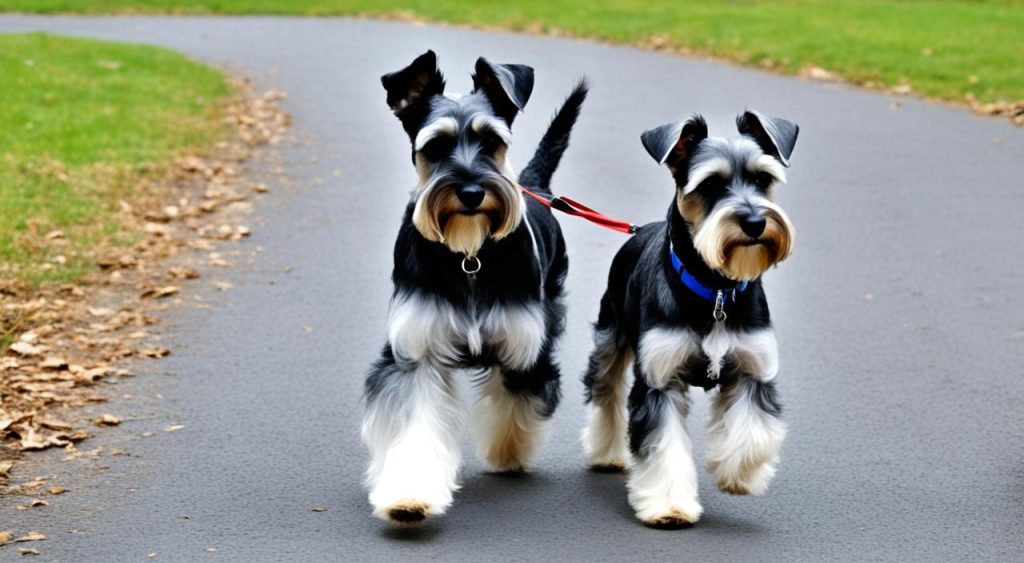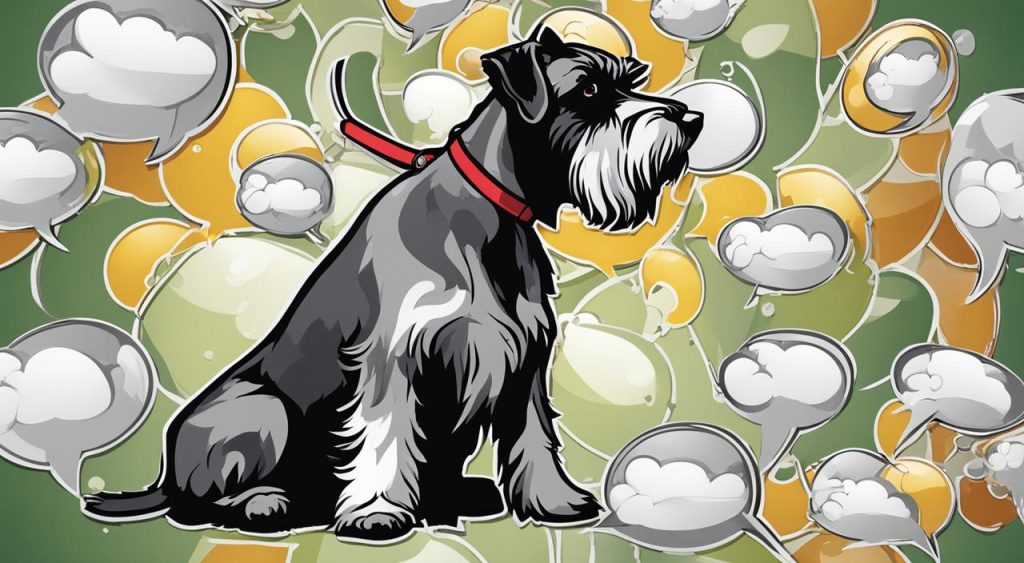As a responsible pet owner, you may be wondering whether Mini Schnauzers can be left alone. These spirited and loyal dogs are beloved members of many families, but it’s important to understand their behavior, tolerance for solitude, and potential separation anxiety.
Miniature Schnauzers are social and outgoing dogs that thrive on human interaction. They form strong bonds with their owners and enjoy being a part of the family. However, their ability to handle alone time may vary depending on factors such as age, past experiences, and individual temperament.
Separation anxiety is a common concern for Mini Schnauzer owners. Their strong attachment to their human family can lead to behaviors such as excessive barking, destructive behavior, and potty accidents when left alone. Recognizing the signs of separation anxiety and implementing appropriate techniques can help alleviate this issue.
When leaving a Miniature Schnauzer alone, establishing a routine and providing a comfortable space are essential. Gradually increasing the duration of alone time and providing mental stimulation through interactive toys can help keep them occupied. Understanding age-related guidelines is important, as puppies may require more gradual training and shorter alone time durations.
Key Takeaways:
- Mini Schnauzers thrive on human interaction and enjoy being a part of the family.
- Their ability to handle alone time may vary based on factors such as age and temperament.
- Separation anxiety is a common concern and can manifest through various behaviors.
- Techniques such as desensitization and positive reinforcement can help manage separation anxiety.
- Establishing a routine and providing mental stimulation are key when leaving a Mini Schnauzer alone.
Understanding Miniature Schnauzer Behavior
Miniature Schnauzers are known for their social and outgoing nature. They have a strong desire for human interaction and enjoy being an integral part of the family. When considering their behavior when left alone, it’s crucial to acknowledge their need for socialization.
Factors such as age, past experiences, and individual temperament play a significant role in a Mini Schnauzer’s independence and tolerance for alone time. Some Miniature Schnauzers may be more independent and comfortable being by themselves, while others may struggle with separation anxiety.
Assessing your Mini Schnauzer’s behavior and adapting the training approach accordingly can ensure a positive experience for both you and your furry friend. Understanding their unique personality traits and needs will help you create a suitable environment when they are alone.
Managing Separation Anxiety in Miniature Schnauzers
Miniature Schnauzers, known for their strong attachment to their human family, can be prone to separation anxiety. This condition can lead to distressing behaviors such as excessive barking, whining, destructive behavior, and potty accidents. To ensure a positive and stress-free experience for both you and your Mini Schnauzer, it’s important to understand and address separation anxiety effectively.
Recognizing Separation Anxiety
Recognizing the signs of separation anxiety is crucial in managing this issue. Common indicators include:
– Excessive vocalization, such as constant barking or whining
– Destructive behavior, such as chewing furniture or scratching doors
– Inappropriate elimination, such as urinating or defecating in the house
– Pacing or restlessness
If your Mini Schnauzer displays any of these behaviors when you’re away, it may be a sign of separation anxiety.
Alleviating Separation Anxiety
There are several techniques you can employ to help alleviate separation anxiety in Miniature Schnauzers:
– Desensitization: Gradually expose your Schnauzer to short periods of alone time, gradually increasing the duration. This helps them build tolerance and confidence.
– Routine establishment: Establish a consistent routine before leaving, which can help your dog feel secure and predictability.
– Positive reinforcement: Use positive reinforcement techniques, such as rewarding your Mini Schnauzer with treats and praise when they exhibit calm behavior during alone time.
It’s important to note that every dog is unique, and what works for one Mini Schnauzer may not work for another. Patience and consistency are key when implementing these techniques.
Professional Help
In more severe cases of separation anxiety, seeking professional help from veterinarians or certified dog trainers may be necessary. They can provide specialized training techniques and guidance tailored to your Mini Schnauzer’s specific needs.
By understanding separation anxiety, recognizing its signs, and utilizing effective techniques, you can help your Miniature Schnauzer feel more comfortable and confident when left alone. Creating a positive alone time experience will ensure a happier, healthier bond between you and your beloved Schnauzer.
Tips for Leaving a Miniature Schnauzer Alone
When you need to leave your Miniature Schnauzer alone, there are several techniques and strategies you can utilize to ensure a positive experience for your furry friend. Start by establishing a consistent routine, as dogs thrive on predictability and structure. This will help your Schnauzer adjust to the alone time and feel more secure in their surroundings.
Gradually increasing the duration of alone time is important. Begin with shorter periods and gradually extend them over time. This allows your Mini Schnauzer to gradually adjust to being alone and reduces the likelihood of separation anxiety. To keep them occupied and mentally stimulated during alone time, provide interactive toys or puzzles that can keep their minds engaged.
It’s crucial to consider the age of your Miniature Schnauzer when determining the duration of alone time. Puppies require more gradual training and shorter alone time durations compared to adult dogs. By understanding age-related guidelines, you can tailor your training approach and ensure a positive experience for your Schnauzer.
Avoid common mistakes that can exacerbate separation anxiety in your Miniature Schnauzer. Avoid abrupt departures and arrivals, as these can create anxiety and anticipation. Instead, make departures and returns low-key and nonchalant. This helps your Schnauzer associate alone time as a normal part of their routine. Excessive greetings and attention upon return can also reinforce anxiety, so keep greetings calm and composed.
By following these tips and techniques, you can help your Miniature Schnauzer develop a sense of independence and confidence when left alone. Remember, each Schnauzer is unique, so be patient and adjust your training methods as necessary. With consistency and understanding, Mini Schnauzer owners can ensure their dogs feel comfortable and secure during alone time.





